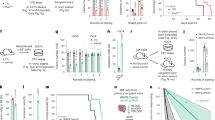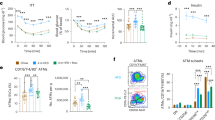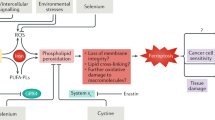Abstract
Obesity increases the risk of developing multiple myeloma (MM). Adiponectin is a cytokine produced by adipocytes, but paradoxically decreased in obesity, that has been implicated in MM progression. Herein, we evaluated how prolonged exposure to adiponectin affected the survival of MM cells as well as putative signaling mechanisms. Adiponectin activates protein kinase A (PKA), which leads to decreased AKT activity and increased AMP-activated protein kinase (AMPK) activation. AMPK, in turn, induces cell cycle arrest and apoptosis. Adiponectin-induced apoptosis may be mediated, at least in part, by the PKA/AMPK-dependent decline in the expression of the enzyme acetyl-CoA-carboxylase (ACC), which is essential to lipogenesis. Supplementation with palmitic acid, the preliminary end product of fatty acid synthesis, rescues MM cells from adiponectin-induced apoptosis. Furthermore, 5-(tetradecyloxy)-2-furancarboxylic acid (TOFA), an ACC inhibitor, exhibited potent antiproliferative effects on MM cells that could also be inhibited by fatty acid supplementation. Thus, adiponectin’s ability to reduce survival of MM cells appears to be mediated through its ability to suppress lipogenesis. Our findings suggest that PKA/AMPK pathway activators, or inhibitors of ACC, may be useful adjuvants to treat MM. Moreover, the antimyeloma effect of adiponectin supports the concept that hypoadiponectinemia, as occurs in obesity, promotes MM tumor progression.
This is a preview of subscription content, access via your institution
Access options
Subscribe to this journal
Receive 12 print issues and online access
$259.00 per year
only $21.58 per issue
Buy this article
- Purchase on Springer Link
- Instant access to full article PDF
Prices may be subject to local taxes which are calculated during checkout






Similar content being viewed by others
References
Blair CK, Cerhan JR, Folsom AR, Ross JA . Anthropometric characteristics and risk of multiple myeloma. Epidemiology 2005; 16: 691–694.
Renehan AG, Tyson M, Egger M, Heller RF, Zwahlen M . Body-mass index and incidence of cancer: a systematic review and meta-analysis of prospective observational studies. Lancet 2008; 371: 569–578.
Britton JA, Khan AE, Rohrmann S, Becker N, Linseisen J, Nieters A et al. Anthropometric characteristics and non-Hodgkin's lymphoma and multiple myeloma risk in the European Prospective Investigation into Cancer and Nutrition (EPIC). Haematologica 2008; 93: 1666–1677.
Sprynski AC, Hose D, Caillot L, Reme T, Shaughnessy JD Jr, Barlogie B et al. The role of IGF-1 as a major growth factor for myeloma cell lines and the prognostic relevance of the expression of its receptor. Blood 2009; 113: 4614–4626.
Rabe K, Lehrke M, Parhofer KG, Broedl UC . Adipokines and insulin resistance. Mol Med 2008; 14: 741–751.
Swarbrick MM, Havel PJ . Physiological, pharmacological, and nutritional regulation of circulating adiponectin concentrations in humans. Metab Syndr Relat Disord 2008; 6: 87–102.
Piya MK, McTernan PG, Kumar S . Adipokine inflammation and insulin resistance: the role of glucose, lipids and endotoxin. J Endocrinol 2013; 216: T1–T15.
Yamauchi T, Kadowaki T . Adiponectin receptor as a key player in healthy longevity and obesity-related diseases. Cell Metab 2013; 17: 185–196.
Dalamaga M, Diakopoulos KN, Mantzoros CS . The role of adiponectin in cancer: a review of current evidence. Endocr Rev 2012; 33: 547–594.
Brakenhielm E, Veitonmaki N, Cao R, Kihara S, Matsuzawa Y, Zhivotovsky B et al. Adiponectin-induced antiangiogenesis and antitumor activity involve caspase-mediated endothelial cell apoptosis. Proc Natl Acad Sci USA 2004; 101: 2476–2481.
Hofmann JN, Liao LM, Pollak MN, Wang Y, Pfeiffer RM, Baris D et al. A prospective study of circulating adipokine levels and risk of multiple myeloma. Blood 2012; 120: 4418–4420.
Fowler JA, Lwin ST, Drake MT, Edwards JR, Kyle RA, Mundy GR et al. Host-derived adiponectin is tumor-suppressive and a novel therapeutic target for multiple myeloma and the associated bone disease. Blood 2011; 118: 5872–5882.
Deepa SS, Dong LQ . APPL1: role in adiponectin signaling and beyond. Am J Physiol Endocrinol Metab 2009; 296: E22–E36.
Mihaylova MM, Shaw RJ . The AMPK signalling pathway coordinates cell growth, autophagy and metabolism. Nat Cell Biol 2011; 13: 1016–1023.
Mason P, Liang B, Li L, Fremgen T, Murphy E, Quinn A et al. SCD1 inhibition causes cancer cell death by depleting mono-unsaturated fatty acids. PLoS One 2012; 7: e33823.
Steinbrunn T, Stuhmer T, Gattenlohner S, Rosenwald A, Mottok A, Unzicker C et al. Mutated RAS and constitutively activated Akt delineate distinct oncogenic pathways, which independently contribute to multiple myeloma cell survival. Blood 2011; 117: 1998–2004.
Hardie DG, Carling D . The AMP-activated protein kinase–fuel gauge of the mammalian cell? Eur J Biochem 1997; 246: 259–273.
Owen MR, Doran E, Halestrap AP . Evidence that metformin exerts its anti-diabetic effects through inhibition of complex 1 of the mitochondrial respiratory chain. Biochem J 2000; 348 (Pt 3): 607–614.
Zhou G, Myers R, Li Y, Chen Y, Shen X, Fenyk-Melody J et al. Role of AMP-activated protein kinase in mechanism of metformin action. J Clin Invest 2001; 108: 1167–1174.
Insel PA, Zhang L, Murray F, Yokouchi H, Zambon AC . Cyclic AMP is both a pro-apoptotic and anti-apoptotic second messenger. Acta Physiol (Oxf) 2012; 204: 277–287.
Mahadev K, Wu X, Donnelly S, Ouedraogo R, Eckhart AD, Goldstein BJ . Adiponectin inhibits vascular endothelial growth factor-induced migration of human coronary artery endothelial cells. Cardiovasc Res 2008; 78: 376–384.
Park PH, Huang H, McMullen MR, Bryan K, Nagy LE . Activation of cyclic-AMP response element binding protein contributes to adiponectin-stimulated interleukin-10 expression in RAW 264.7 macrophages. J Leukoc Biol 2008; 83: 1258–1266.
Li G, Cong L, Gasser J, Zhao J, Chen K, Li F . Mechanisms underlying the anti-proliferative actions of adiponectin in human breast cancer cells, MCF7-dependency on the cAMP/protein kinase-A pathway. Nutr Cancer 2011; 63: 80–88.
Wijesekara N, Krishnamurthy M, Bhattacharjee A, Suhail A, Sweeney G, Wheeler MB . Adiponectin-induced ERK and Akt phosphorylation protects against pancreatic beta cell apoptosis and increases insulin gene expression and secretion. J Biol Chem 2010; 285: 33623–33631.
Kim KY, Baek A, Hwang JE, Choi YA, Jeong J, Lee MS et al. Adiponectin-activated AMPK stimulates dephosphorylation of AKT through protein phosphatase 2A activation. Cancer Res 2009; 69: 4018–4026.
Hutchinson DS, Chernogubova E, Dallner OS, Cannon B, Bengtsson T . Beta-adrenoceptors, but not alpha-adrenoceptors, stimulate AMP-activated protein kinase in brown adipocytes independently of uncoupling protein-1. Diabetologia 2005; 48: 2386–2395.
Lou L, Urbani J, Ribeiro-Neto F, Altschuler DL . cAMP inhibition of Akt is mediated by activated and phosphorylated Rap1b. J Biol Chem 2002; 277: 32799–32806.
Chijiwa T, Mishima A, Hagiwara M, Sano M, Hayashi K, Inoue T et al. Inhibition of forskolin-induced neurite outgrowth and protein phosphorylation by a newly synthesized selective inhibitor of cyclic AMP-dependent protein kinase, N-[2-(p-bromocinnamylamino)ethyl]-5-isoquinolinesulfonamide (H-89), of PC12D pheochromocytoma cells. J Biol Chem 1990; 265: 5267–5272.
Bhatt AP, Jacobs SR, Freemerman AJ, Makowski L, Rathmell JC, Dittmer DP et al. Dysregulation of fatty acid synthesis and glycolysis in non-Hodgkin lymphoma. Proc Natl Acad Sci USA 2012; 109: 11818–11823.
Menendez JA, Lupu R . Fatty acid synthase and the lipogenic phenotype in cancer pathogenesis. Nat Rev Cancer 2007; 7: 763–777.
Beckers A, Organe S, Timmermans L, Scheys K, Peeters A, Brusselmans K et al. Chemical inhibition of acetyl-CoA carboxylase induces growth arrest and cytotoxicity selectively in cancer cells. Cancer Res 2007; 67: 8180–8187.
Swinnen JV, Brusselmans K, Verhoeven G . Increased lipogenesis in cancer cells: new players, novel targets. Curr Opin Clin Nutr Metab Care 2006; 9: 358–365.
Ha J, Daniel S, Broyles SS, Kim KH . Critical phosphorylation sites for acetyl-CoA carboxylase activity. J Biol Chem 1994; 269: 22162–22168.
Yamauchi T, Kamon J, Minokoshi Y, Ito Y, Waki H, Uchida S et al. Adiponectin stimulates glucose utilization and fatty-acid oxidation by activating AMP-activated protein kinase. Nat Med 2002; 8: 1288–1295.
Kim AY, Lee YS, Kim KH, Lee JH, Lee HK, Jang SH et al. Adiponectin represses colon cancer cell proliferation via AdipoR1- and -R2-mediated AMPK activation. Mol Endocrinol 2010; 24: 1441–1452.
Halvorson DL, McCune SA . Inhibition of fatty acid synthesis in isolated adipocytes by 5-(tetradecyloxy)-2-furoic acid. Lipids 1984; 19: 851–856.
McCune SA, Harris RA . Mechanism responsible for 5-(tetradecyloxy)-2-furoic acid inhibition of hepatic lipogenesis. J Biol Chem 1979; 254: 10095–10101.
Okada-Iwabu M, Yamauchi T, Iwabu M, Honma T, Hamagami K, Matsuda K et al. A small-molecule AdipoR agonist for type 2 diabetes and short life in obesity. Nature 2013; 503: 493–499.
Schmitt JM, Stork PJ . PKA phosphorylation of Src mediates cAMP's inhibition of cell growth via Rap1. Mol Cell 2002; 9: 85–94.
Naviglio S, Di Gesto D, Illiano F, Chiosi E, Giordano A, Illiano G et al. Leptin potentiates antiproliferative action of cAMP elevation via protein kinase A down-regulation in breast cancer cells. J Cell Physiol 2010; 225: 801–809.
Collins SP, Reoma JL, Gamm DM, Uhler MD . LKB1, a novel serine/threonine protein kinase and potential tumour suppressor, is phosphorylated by cAMP-dependent protein kinase (PKA) and prenylated in vivo. Biochem J 2000; 345 (Pt 3): 673–680.
Xie Z, Dong Y, Scholz R, Neumann D, Zou MH . Phosphorylation of LKB1 at serine 428 by protein kinase C-zeta is required for metformin-enhanced activation of the AMP-activated protein kinase in endothelial cells. Circulation 2008; 117: 952–962.
Fu D, Wakabayashi Y, Lippincott-Schwartz J, Arias IM . Bile acid stimulates hepatocyte polarization through a cAMP-Epac-MEK-LKB1-AMPK pathway. Proc Natl Acad Sci USA 2011; 108: 1403–1408.
Mashima T, Seimiya H, Tsuruo T . De novo fatty-acid synthesis and related pathways as molecular targets for cancer therapy. Br J Cancer 2009; 100: 1369–1372.
Lane MD, Moss J, Polakis SE . Acetyl coenzyme A carboxylase. Curr Top Cell Regul 1974; 8: 139–195.
Pape ME, Lopez-Casillas F, Kim KH . Physiological regulation of acetyl-CoA carboxylase gene expression: effects of diet, diabetes, and lactation on acetyl-CoA carboxylase mRNA. Arch Biochem Biophys 1988; 267: 104–109.
Tirado-Velez JM, Joumady I, Saez-Benito A, Cozar-Castellano I, Perdomo G . Inhibition of fatty acid metabolism reduces human myeloma cells proliferation. PLoS One 2012; 7: e46484.
Guo D, Hildebrandt IJ, Prins RM, Soto H, Mazzotta MM, Dang J et al. The AMPK agonist AICAR inhibits the growth of EGFRvIII-expressing glioblastomas by inhibiting lipogenesis. Proc Natl Acad Sci USA 2009; 106: 12932–12937.
Lin VC, Tsai YC, Lin JN, Fan LL, Pan MH, Ho CT et al. Activation of AMPK by pterostilbene suppresses lipogenesis and cell-cycle progression in p53 positive and negative human prostate cancer cells. J Agric Food Chem 2012; 60: 6399–6407.
Woods A, Azzout-Marniche D, Foretz M, Stein SC, Lemarchand P, Ferre P et al. Characterization of the role of AMP-activated protein kinase in the regulation of glucose-activated gene expression using constitutively active and dominant negative forms of the kinase. Mol Cell Biol 2000; 20: 6704–6711.
Horton JD, Goldstein JL, Brown MS . SREBPs: activators of the complete program of cholesterol and fatty acid synthesis in the liver. J Clin Invest 2002; 109: 1125–1131.
Zhao S, Zhu L, Duan H, Liu S, Liu Q, Liu W et al. PI3K/Akt pathway mediates high glucose-induced lipid accumulation in human renal proximal tubular cells via spliced XBP-1. J Cell Biochem 2012; 113: 3288–3298.
Porstmann T, Griffiths B, Chung YL, Delpuech O, Griffiths JR, Downward J et al. PKB/Akt induces transcription of enzymes involved in cholesterol and fatty acid biosynthesis via activation of SREBP. Oncogene 2005; 24: 6465–6481.
Boden G . Obesity and free fatty acids. Endocrinol Metab Clin North Am 2008; 37: 635–646, viii–ix.
Acknowledgements
We thank RC Aguiar, MD, PhD, for critical review of the manuscript and LQ Dong, PhD, for useful discussions during this research. Grant number KL2TR001118 from the National Institutes of Health’s National Center for Advancing Translational Sciences and a Multiple Myeloma Research Foundation Research Fellow Award (EAM) supported this work.
Author information
Authors and Affiliations
Corresponding author
Ethics declarations
Competing interests
The authors declare no conflict of interest.
Additional information
Supplementary Information accompanies this paper on the Leukemia website
Rights and permissions
About this article
Cite this article
Medina, E., Oberheu, K., Polusani, S. et al. PKA/AMPK signaling in relation to adiponectin’s antiproliferative effect on multiple myeloma cells. Leukemia 28, 2080–2089 (2014). https://doi.org/10.1038/leu.2014.112
Received:
Revised:
Accepted:
Published:
Issue Date:
DOI: https://doi.org/10.1038/leu.2014.112
This article is cited by
-
Synthetic adiponectin-receptor agonist, AdipoRon, induces glycolytic dependence in pancreatic cancer cells
Cell Death & Disease (2022)
-
A comprehensive review of the impact of obesity on plasma cell disorders
Leukemia (2022)
-
Phosphodiesterase 4D promotes angiotensin II-induced hypertension in mice via smooth muscle cell contraction
Communications Biology (2022)
-
Reduced Progression of Monoclonal Gammopathy of Undetermined Significance to Multiple Myeloma in Type 2 Diabetes Mellitus: Will Metformin Never Stop Its Pleasant Surprises?
Advances in Therapy (2022)
-
Quercetin, Engelitin and Caffeic Acid of Smilax china L. Polyphenols, Stimulate 3T3-L1 Adipocytes to Brown-like Adipocytes Via β3-AR/AMPK Signaling Pathway
Plant Foods for Human Nutrition (2022)



